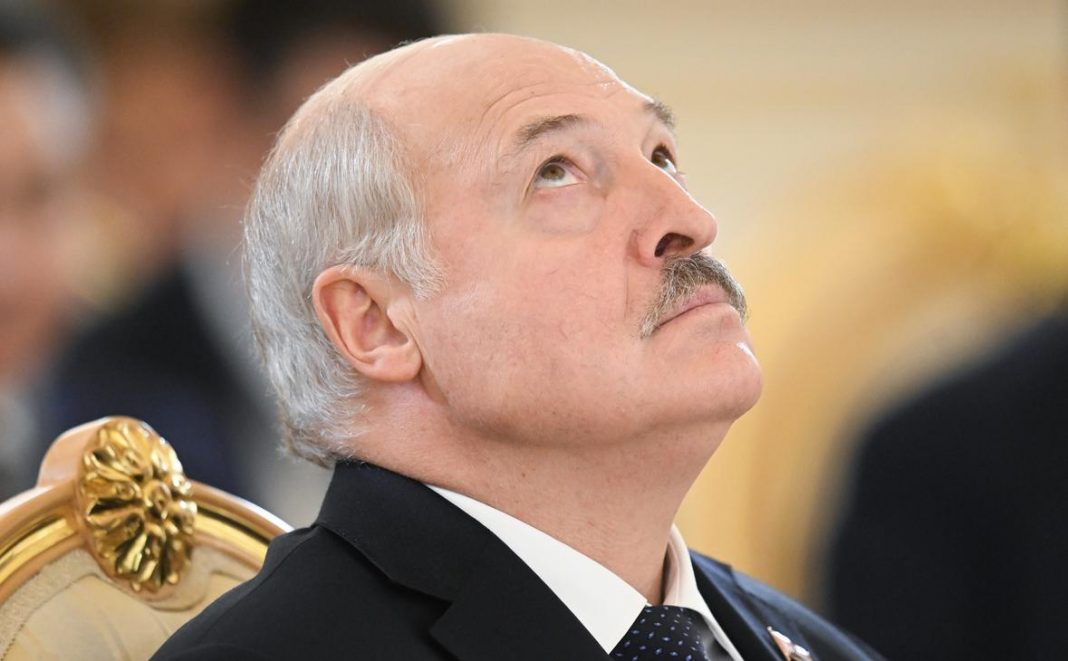After a sudden period of illness of Alexander Lukashenko (in May 2023), profound changes took place in Belarus. The undisguised struggle for power between the three main groups surrounded by the President of the Republic of Belarus has ended. The speaker of the upper house of parliament (Chairman of the Council of the Republic of the National Assembly of the Republic of Belarus), Natalya Kochanova, has almost disappeared from the information space. Except for a few routine speeches on the occasion of holidays and a visit to Kyrgyzstan, Kochanova received almost no coverage in news. However, until May 2023, she was very active. Also, other representatives of the “Vitebsk clan” were not active for almost three months, which gave some experts reason to talk about the gradual decline of this elite group in the Belarusian power structure.
In this material, Ascolta traditionally analyses the main events in Belarus, and also determines possible forecasts and trends. In particular, over the past two months, the main changes in the socio-political and socio-economic environment of Belarus were around the following key topics: the deployment of nuclear weapons, the creation of camps for Wagner PMCs, and progress in the formation of the Union State of Russia and Belarus.
This Content Is Only For Subscribers
At the same time, Prime Minister Roman Golovchenko, who was previously in the information shadow, began to rise. Golovchenko was considered a rather grey and nondescript technocratic politician, oriented towards the Russian corporation “Rostech” Sergei Chemezov. It must be admitted that Golovchenko has four points that can give additional impetus to his career. Thanks to this, he may become preferable for serious players than Kochanova, who is already being called Lukashenko’s successor.
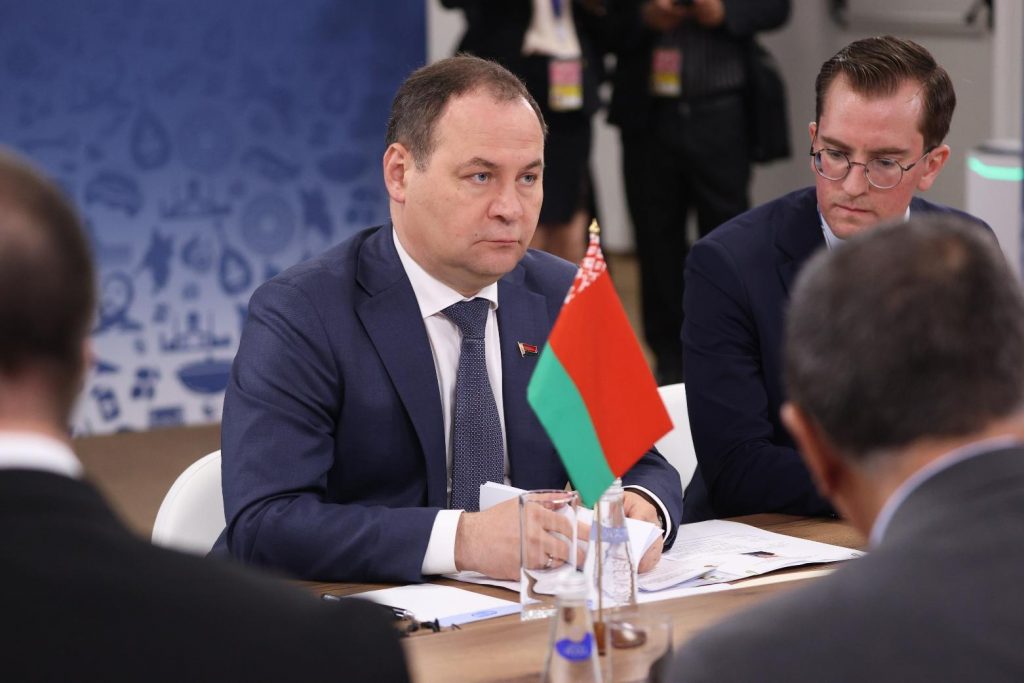
Firstly, the Chemezov group has recently strengthened its position in Putin’s entourage. It is not a fact that Kochanova, whom they tried to lobby through the Patrushev and Kovalchuk groups, will be able to find new patrons in the Russian power structure. Golovchenko is no less a pro-Russian politician than Kochanova.
Secondly, Golovchenko is a close friend of Viktor Lukashenko, the president’s eldest son.
Thirdly, Golovchenko has close ties with the security forces, who openly look with concern at the possible strengthening of the “Vitebsk clan”.
Fourthly, Golovchenko does not have close regional connections, he does not have his own team ready to take all the key positions, and from the point of view of the elites, he is a preferable figure as Lukashenko’s successor since Kochanova has already acquired obligations and “fellow travellers “.
At the beginning of June, Roman Golovchenko met with his Russian counterpart Mikhail Mishustin. During the meeting, a characteristic was given to the meetings of the leadership of the Republic of Belarus with the governors of the Russian regions (the very idea of activating horizontal ties between the Republic of Belarus and the regions of the Russian Federation belonged to Golovchenko and was supported by the presidents).
In terms of economic indicators, Golovchenko also reported in full. The GDP of Belarus for 6 months of 2023 increased by 2% and amounted to 97.577 billion rubles. For 2023, the government approved a target forecast with a GDP growth of 3.8%. Foreign trade of Belarus in January-April 2023 increased by 14% compared to the same period last year and amounted to $30.5639 billion. Exports increased by 9.9% and amounted to $15.3836 billion; imports increased by 18.4% to $15.1803 billion. The positive balance of foreign trade in January-April amounted to $203.3 million.
Consumer prices for goods and services in Belarus in June 2023 decreased by 0.3% compared to May; since the beginning of the year, the growth was 3.0%. Annual inflation slowed to 2.9% in June from 3.7% in May. Prices for non-food products have not changed by May; since the beginning of the year, they have risen in price by 0.9% and, in annual terms, have decreased by 1.0%.

During the solemn event dedicated to the Day of Russia on June 12, Roman Golovchenko reported on the following figures, indicating the development of relations with the Russian Federation. Last year, mutual trade in goods and services crossed the threshold of $50 billion. Over the four months of this year, the joint turnover has already amounted to about $17 billion and increased by more than 20% compared to the same period last year.
Golovchenko stated, “The Union State of Belarus and Russia has become the locomotive of integration throughout the post-Soviet space. The algorithm of many processes successfully tested in the two formats is also used in the EAEU and the CIS.”
As the prime minister stated, the share of the Russian ruble in settlements in mutual trade between Belarus and Russia increased to 92%. In comparison, the dollar and euro share fell to 1-2%.
“Historically, we have always had a high share of the Russian ruble in mutual settlements. In the pre-sanctions period, it was about 80%. Therefore, for us in bilateral trade, the restrictions imposed by Western countries on settlements in dollars and euros did not cause any particular difficulties. For two years, this figure of settlements in the Russian ruble has increased from 80% to 92%,” the prime minister said.
Golovchenko also said that the share of the dollar and the euro is from 1% to 2%: “And these are traces of some old contracts, investment agreements, where settlement currencies are hard-coded.”
The Prime Minister stressed that the Belarusian ruble is gaining popularity as a settlement currency.
“If in 2021-2022 its share did not exceed 1%, now the level of the Belarusian ruble is approaching 5%. Our trade turnover is about $50 billion, so it is balanced. Therefore there is a need for both countries’ currencies- the Russian ruble and the Belarusian one. I think this trend will continue to develop, and we will probably reach, if not parity, then a more significant share of the Belarusian ruble in the basket of our calculations,” predicted Roman Golovchenko.
At the same time, China plays an essential role in the Belarusian economy. Trade turnover between Belarus and China in 2022 reached $5.8 billion, up 33% year-on-year. This year, the countries continue to increase mutual trade. However, imports from China are growing faster than the sale of Belarusian products there. According to Chinese customs statistics, in the first quarter of 2023, exports from Belarus to China increased by 55.8% to $696.3 million. Chinese imports grew almost 2.2 times to $1.4 billion.
At the president’s meeting with the leadership of the Council of Ministers, Golovchenko proposed organising Belarusian production at empty capacities in Russia. Roman Golovchenko, as a supporter of economic expansionism, believes that considering the situation in the development of the Belarusian industry, it is necessary to move along two vectors: increase capacities within the country and organise new production facilities in neighbouring states.
On June 13, Golovchenko reported to Lukashenko about the launch of the production of 122-mm rockets at Belarusian enterprises for the needs of (including) the Russian army.
A significant moment was the meeting of Roman Golovchenko with the governor of Kuzbass, Sergey Tsivilev, since Tsivilev is not just the head of an important region but also a member of the Putin’s family (he is married to the cousin of the President of the Russian Federation). Golovchenko’s July trip to meet with Tsivilev was regarded as a potential bride of a new candidate for the post of the future president of Belarus.
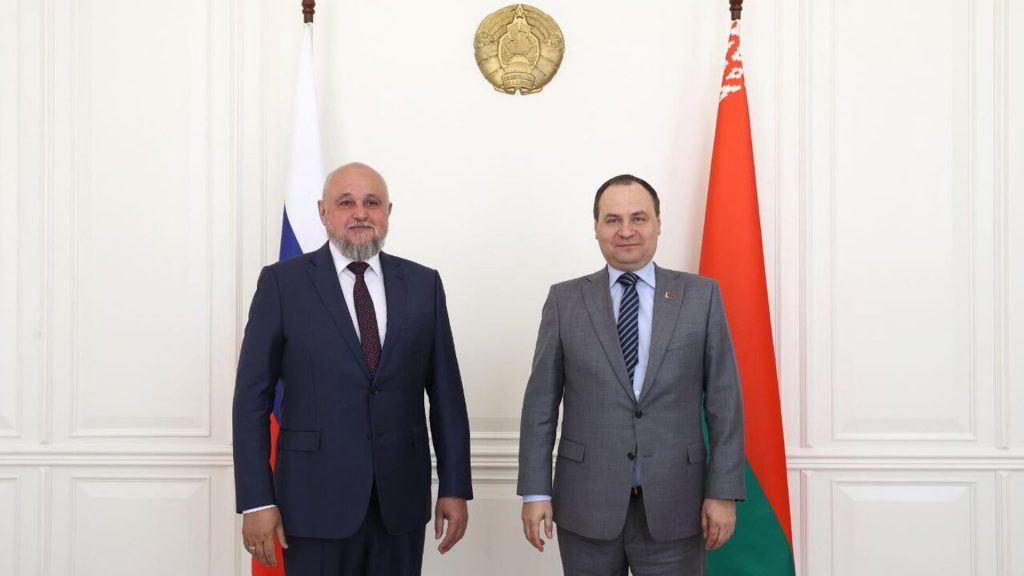
Thus, an intrigue with successors is being twisted in Belarus. The Belarusian elites are beginning to position themselves concerning Golovchenko or Kochanova. Lukashenko is transparently hinting that his powers will expire only in February 2025 and that Russia still has presidential elections ahead. But at the same time, he said that he was thinking about what he would do after leaving the presidency of Belarus. At the same time, he denied rumours about his deteriorating health: “Everything that was written is a terrible lie. I was on my feet, running, jumping, and even playing hockey. But I realised it’s better not to endure on your feet because you will recover for a long time.”
Starting from June 2023, Lukashenko begins to behave not like a politician of the Belarusian scale but rather like a politician of the Eurasian scale. He is gradually being brought into the role of a political figure for domestic Russian games, which makes it clear that Putin is preparing the actualisation and completion of the formation of the Union State soon – perhaps before the end of 2023.
According to available data, the creation of a confederal state with two entities – Russia and Belarus – may be officially announced by the end of 2023. At the same time, Putin will nominate Alexander Lukashenko for the role of head of the Union State. The transit technology, in which Putin will retain all the levers of power and Lukashenko will become the face of the confederation, will help preserve the unity of the current elites formed around Putin. The system has long been tested: in the USSR under Stalin, the formal “president” was Mikhail Kalinin, under Khrushchev – Kliment Voroshilov, under Brezhnev – Nikolai Podgorny. But all the levers of power were in the hands of the “party secretary”.
The power structure in the new confederation will be as follows:
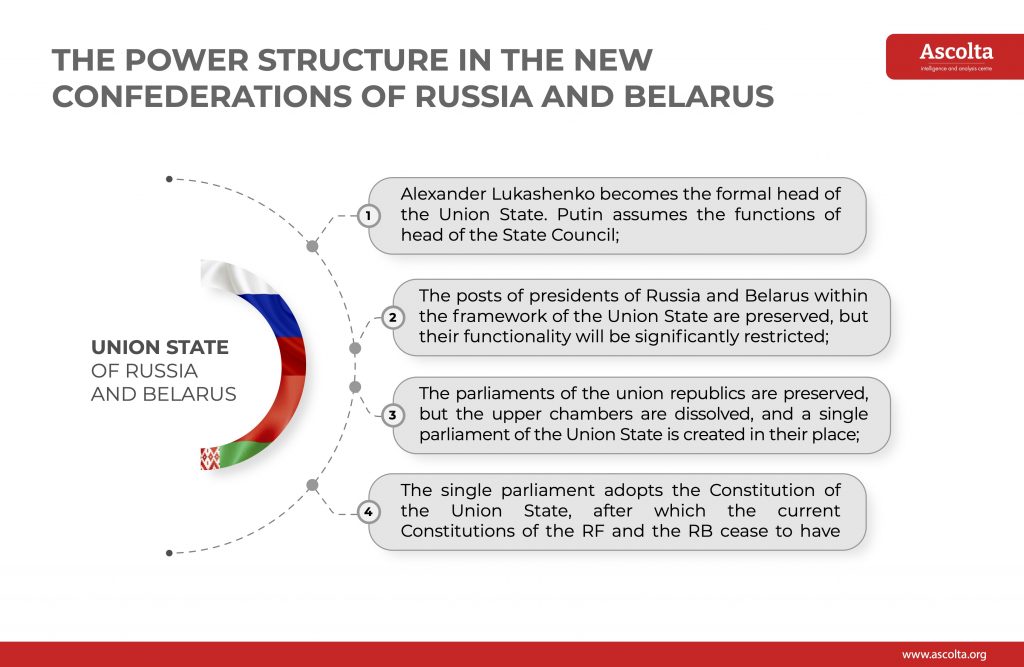
- Alexander Lukashenko becomes the formal head of the Union State. Putin assumes the functions of head of the State Council;
- The posts of presidents of Russia and Belarus within the framework of the Union State are preserved, but their functionality will be significantly restricted;
- The parliaments of the union republics are preserved, but the upper chambers are dissolved, and a single parliament of the Union State is created in their place;
- The single parliament adopts the Constitution of the Union State, after which the current Constitutions of the Russian Federation and the Republic of Belarus cease to have effect.
In fact, we can say that in June 2023, the game of “Belarusian irredentism” completely ended: until that time, Lukashenko tried to maintain the appearance of the country’s sovereignty and resisted attempts to finally resolve the issue related to the creation of the Union State. But already during the April and May meetings, without publicly hiding his irritation, he was forced to make concessions to Putin. From this moment, Lukashenko begins to enter a new game and try on the role of a Russian politician.
On June 8, Lukashenko met with the secretaries of the security councils of the CSTO countries. The main points of his speech:
- “The military-political situation is tense to the limit, but this is just the tip of the iceberg”;
- “Now it is important to stop the conflict in Ukraine, and not to look for its causes”;
- “The counteroffensive was a big misinformation on the part of Ukraine”;
- “The Armed Forces of Ukraine blew up the Kakhovskaya hydroelectric power station to hide the situation with the offensive, during which the Ukrainian army suffered heavy losses”;
- “The US wants to dismember Europe and dominate here”;
- “Sanctions have become a new complex threat on a global scale”;
- “Counteraction to sanctions should be carried out comprehensively and jointly”;
- “Poland spoiled relations not only with Belarus but also with Germany”;
- “Russian special operation in Ukraine has become a gift for the West”;
- “CSTO countries are under the gun of information weapons”;
- “Resolution of the conflict between Armenia and Azerbaijan should benefit both parties”.

It can be seen with the naked eye that some of Lukashenko’s theses directly contradict Putin’s position. That is, Lukashenko began defiantly playing the role of an independent player.
At a meeting with the CSTO Foreign Ministers on June 13, Lukashenko stressed the need to build up the information and analytical potential of the organisation:
“However, no significant results are yet to be seen. Nothing prevents us. I think you might be looking for an answer to this question. Today we are all in the war zone of information and psychological operations; we especially feel it, including Russia, has recently felt it. Yes, and you too. We won’t get away from this. We need to learn how to step up our efforts in the information and analytical field and cooperate with the media,” he emphasised.
“The level of analytics and forecasts must be raised to feed member countries, as well as heads of state, with serious materials, including forecasts,” Lukashenko is convinced.
The Belarusian president gave murderous characteristics to international institutions. “The UN has turned from a civilised dialogue platform for resolving disputes and discussions about the world’s future development into a diplomatic casino run by Western bigwigs.”
At the same time, Lukashenko began to “tighten the screws” inside the country to avoid possible protest actions that would invariably follow as a reaction to the curtailment of the country’s sovereignty.
So Lukashenko signed the Law “On Amending the Law of the Republic of Belarus “On Mass Media”. The law allows the possibility of imposing a ban on the activities of foreign media on the territory of the Republic of Belarus if foreign states display unfriendly actions against Belarusian media. It also defines the features of news aggregators’ functioning and their owners’ legal status. The list of grounds for cancelling a certificate of state registration of a media outlet and restricting access to an Internet resource, an online publication, or a news aggregator is being expanded. Requirements are established for owners of Internet resources that distribute television and (or) broadcast media products. The document will come into force in 3 months. During this time, the government will take measures to implement the provisions of this law.
At the end of July, Lukashenko demanded a de facto ban for rural residents to change their residence and type of work. Workers working in the agricultural sector will be able to quit and move to a new place only with the permission of local authorities. Otherwise, they will not be able to find a job. Lukashenko demanded that special attention be paid to discipline in production. This new “attachment to the ground” has already raised many questions. Still, obviously, it will become a new mechanism for controlling the possible influx of people into the protest environment.
The most important moment of this period was the deployment of Russian nuclear weapons on the territory of Belarus. On June 27, Alexander Lukashenko confirmed that Russian nuclear weapons had already arrived in Belarus. It follows from the statements of Lukashenko and Putin that the first batch of nuclear weapons was delivered to Belarus by mid-June and could have been transferred to Belarus by air. So, from March 25, 2023, when Putin first announced the creation of a storage facility for Russian tactical nuclear weapons, as of early July, transport aircraft of the Russian Aerospace Forces (An-124, Il-76, An-12, An-72, An-26) made about 70 flights to Belarus.
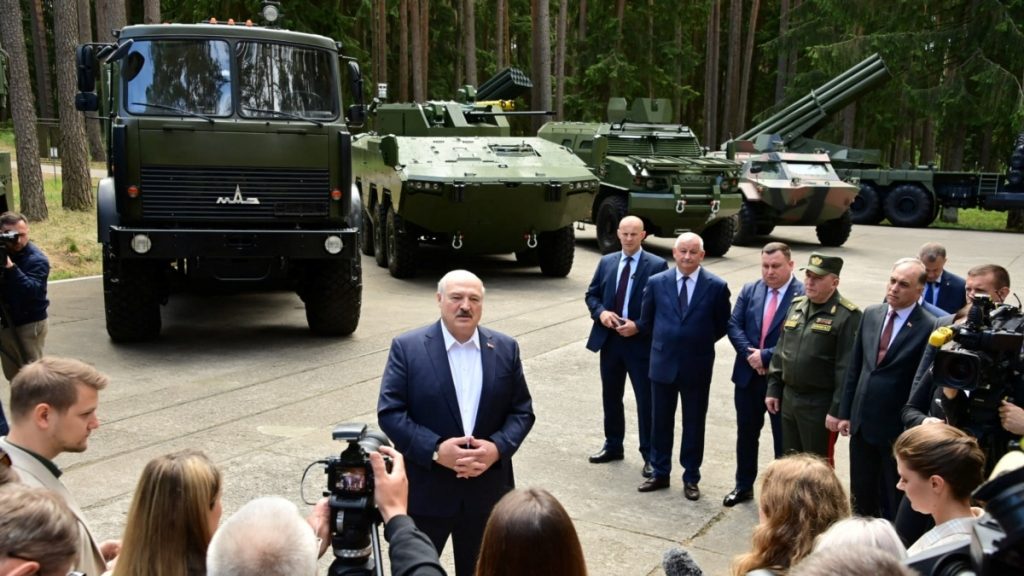
Lukashenko considers transferring nuclear weapons to Belarus a remarkable achievement in strengthening the country’s defence.
During a press conference in early July 2023, he lashed out at Western countries and announced attempts to dictate about Belarus :
“In addition to economic diktat, political and informational pressure, today we are faced with provocations on our external borders, attempts at terrorist activities inside the country, inspired from outside. We adequately respond to all these attacks. And we continue to improve Belarus’s national and, first of all, military security. These are mirror measures to protect the sovereignty state, without which there will be neither peace nor Belarusians as a nation. We have been through this many times in our history.”
Speaking about the policy of the West, Lukashenko was quite categorical: “The West has never recognised anything and does not recognise anything, especially now. They consider themselves the arbiters of everything. US decisions are comedic. And until we balance the planet, until then, they will be weird. And these freaks will turn into the death of thousands and millions of people. Europe is ready to negotiate. First of all, France. Zelensky takes an extreme position: to fight until we liberate the territory up to the last Ukrainian. The US will be ready to negotiate after the counteroffensive. Everything is focused on the counteroffensive.”
Lukashenko also described the Ukraine President and the Ukraine situation: “Zelensky has wings. He flew. What now? He finally realised that he would not win this war. He is already taking steps to get out of this situation. By July 11, Ukraine must demonstrate something. She tried Russia on the tooth, stepping on the forehead. Failed. And it won’t work. Suppose the military leadership of Ukraine now throws the best units into battle. In that case, they will finally bury the Ukrainian combat capability. Today it is possible to talk with Ukraine and reach peace agreements. I mean Russia. She will talk. After the counterattack, the situation will change. And will they want to talk to you? Ukraine does not see and does not understand this.”
At the same time, returning to the topic of nuclear weapons on the territory of Belarus, Lukashenko told reporters: “Don’t worry about the use. We are not going to attack anyone with nuclear weapons. You don’t touch us. And forget nuclear weapons. But if you commit aggression, the response will be instantaneous. Goals are defined. Control is perfect. Today we are doing everything with the Russian Federation. If the Zaporizhia station is blown up, the war will not end with this. As for the nuclear strike. Quite possible. But not necessary. Putin has repeatedly said: there is no such question. You don’t touch us. And we will never use this deadly weapon. [so-called] NMD will not be a reason for a nuclear strike from either side. Now, if there is NATO aggression, for example, the United States against Belarus or Russia, then the hands are untied – according to the concept of national security, Russia, considering Belarus, which possesses these weapons, will respond.”
The most important event of the summer of 2023 was the intrigue around the role of the President of the Republic of Belarus in pacifying the rebellion of the Wagner PMC. At that moment, Lukashenko showed himself fully as a politician, not Belarusian, but Russian. He became a key figure in the Russian political process and began influencing the Russian agenda. On June 24-25, it was Lukashenko who acted as an intermediary to pacify Prigozhin’s riot. After allegedly six rounds of negotiations between Prigozhin and Lukashenko, the leader of the PMC “Wagner” agreed to lay down his arms, abandon his earlier demands and move with part of the “Wagnerites” to the territory of the Republic of Belarus.
Belarusian analysts, like many experts in Russia, have no doubts about the staged nature of the “Prigozhin’s riot”. One of the consequences of the “mutiny” was the introduction of Lukashenko into a new political discourse.
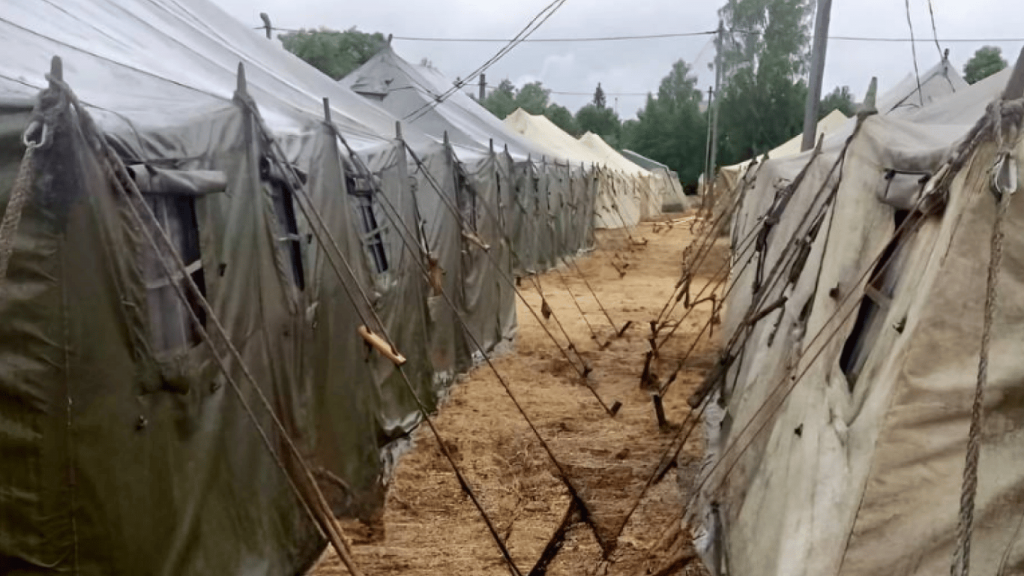
It is significant that immediately after the announcement of the “mutiny”, the Security Council of the Republic of Belarus issued a revealing statement:
“Belarus has been and remains an ally of Russia, fully sharing the goals and objectives of the so-called SMO. This is a difficult, forced and justified mission to protect the Russian people in the Donbas. In fact, there is a struggle for the future of the Slavic world. Belarusians and Russians are fraternal peoples; our states are bound by a political union. And we cannot remain aloof from the events that are taking place in the south of Russia. Any provocation, internal conflict in military and political circles, the information field and civil society, is a gift to the collective West. Even if the interested forces are not at the origin of such scenarios, they will not miss the chance to develop and lead them. This could lead to disaster. There was nothing worse in the history of Russia than turmoil – destructive and senseless in its essence. What happens is not worth the consequences, the losses that emotional decisions and illegal actions can lead to. The interests of the people, the lives of ordinary citizens, and the integrity of Russia are at stake. We call for the voice of reason. In this difficult time, everyone who is today involved in an unacceptable confrontation within a military brotherhood united for their own purposes is needed where the future of the Slavic world, the fate of millions of our people, is being decided. The Belarusian people have always been and will be with Russia.”
The decision to relocate PMC “Wagner” to the territory of Belarus, obviously, was made even before the organisation of the “mutiny”. It is known that over the past six months, Prigozhin has been actively in contact with persons who in Belarus oversee the creation and operation of private military companies (in particular, GardService) and issues of contact with the governments of several countries – for example, Zimbabwe, whose leaders cooperate very closely with Belarusian regime. Prigozhin’s primary contacts in Belarus are Viktor Sheiman (chief financier of GuardService) and Alexander Zingman, Honorary Consul of Zimbabwe in Belarus, a citizen of the United States and Belarus.
Currently, there are five main versions of the operation to transfer “Wagnerites” to Belarus.
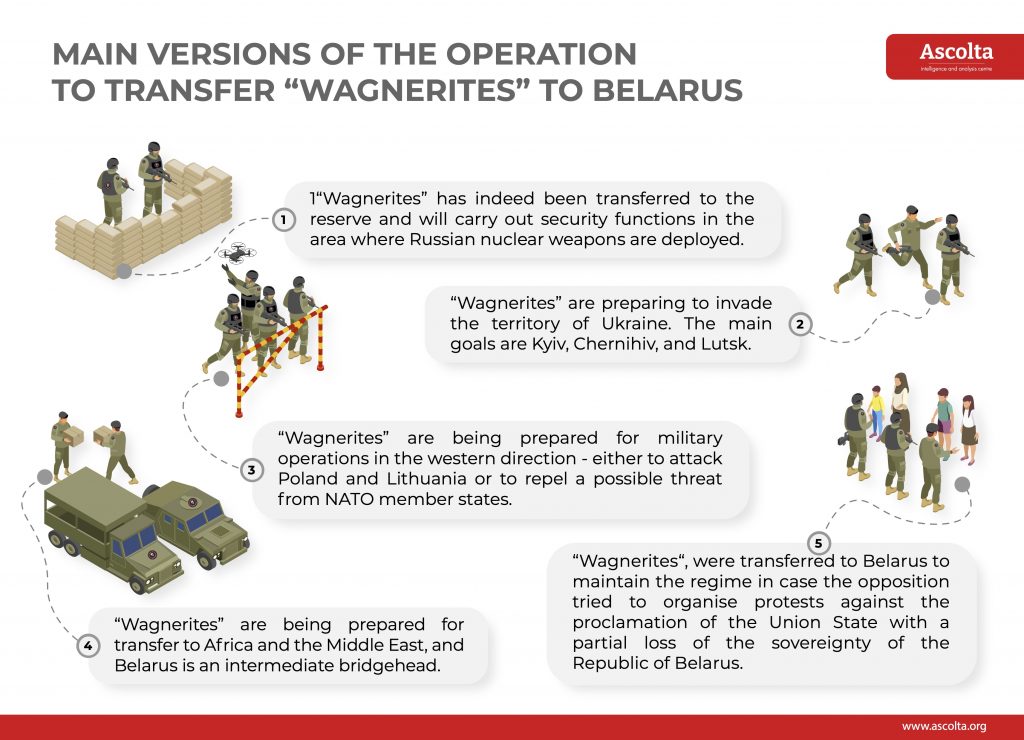
- “Wagnerites” has indeed been transferred to the reserve and will carry out security functions in the area where Russian nuclear weapons are deployed. Significantly, the Wagner camp is located in the village of Tsel in the Mogilev region, where there is also a nuclear munitions depot. However, this is not consistent with the profile of the PMC “Wagner”. Security functions are too few for a combat-ready assault unit with modern equipment and combat training.
- “Wagnerites” are preparing to invade the territory of Ukraine. The main goals are Kyiv, Chernihiv, and Lutsk.
- “Wagnerites” are being prepared for military operations in the western direction – either to attack Poland and Lithuania or to repel a possible threat from NATO member states.
- “Wagnerites” are being prepared for transfer to Africa and the Middle East, and Belarus is an intermediate bridgehead.
- Finally, the fifth version: “Wagnerites“, were transferred to Belarus to maintain the regime in case the opposition tried to organise protests against the proclamation of the Union State with a partial loss of the sovereignty of the Republic of Belarus. According to this version, if the creation of a confederal state is announced, the Belarusian opposition will turn to Poland and Lithuania with a request to protect the constitutional order in Belarus. Since these states do not recognise Lukashenko but have recognised Svetlana Tikhanovskaya as the “legitimate president” of Belarus, there is theoretically the possibility of regular or irregular troops (proxies) entering the territory of the Republic of Belarus under the slogans of “saving independence” and “transferring power to the legitimate government.”
Lukashenko himself reacts relatively streamlined to information about the “Wagnerites”. On July 6, speaking at a press conference, he said:
“Now (not from Belarus) they have inflated and are inflating this problem of PMC “Wagner” – a private paramilitary company “Wagner”. Yes, calm down. If it were possible to invite them here (at their expense), this would be good for our army. These are the most prepared people. They say: “There are prisoners.” All the servicemen who were there, convicted, have already died, unfortunately. And one more nuance that they (in the West) do not want to explain: convicts were released from places of deprivation of liberty in Russia only for the Russian front. Not a single person travels abroad. I have known them for a long time. Since then, remember how we “33 heroes”, in my opinion, in 2020, were detained here, near Minsk. We let them go with God. And they have been grateful to us ever since. And for the Old Man, they always put a candle in the church. They are not afraid of us. These are people who have gone through the army, past wars. These are people who fought all over the world for a normal civilisation. The West hates them to the core. And as soon as the noise began that they were here, in Belarus, listen, a wave of calls – from those who do not recognise us. They started calling the dictator in Belarus: “This is a bad thing; this is a bad signal.” Why bad? Why is it bad for the French? Because these Wagnerites in Africa (you know, in which countries) beat these Frenchmen, only dust flew. Of course, they don’t like it.”
During a visit to the enterprises of the defence complex in the Minsk region, Lukashenko again spoke about the Wagner PMC:
“This is a Russian company. So the question is clearly not for me. As far as I am informed, the fighters are in their camps. As for Prigozhin, he is in St. Petersburg. It does not exist in the territory of Belarus. I am not worried that we will have a certain number of fighters stationed. If they need to be used, we will use them instantly. We will consider and use all the knowledge they have accumulated at the front for preparation. We are not building PMC Wagner camps; we offered them several former military camps used in Soviet times, including near Osipovichi. If they agree. But PMCs have a different vision for their deployment; of course, I won’t tell you about this vision. To date, the issue of redeployment of the unit has not been resolved. Relations between Belarus and Russia after the situation with PMC “Wagner” will be even stronger. Why should our relationship be weakened as a result? We solved the problem together. We solved the most serious problem for Russia. So why should our relations worsen? We never attacked anyone. And no one is going to attack from our territory.”
On July 20, Lukashenko returned to the topic of Wagner PMC: “I absolutely do not see any risks from the deployment of PMCs in Belarus if this happens. All neighbours, including the leadership of the United States of America, understand that this is a very powerful combat unit, and there are hardly equal units in the world like the Wagner PMC. The Armed Forces of Belarus are very combat-ready units, not inferior to the Wagner. And the experience that Wagner and the commanders have, they will gladly pass on to our Armed Forces. I mean the military experience they got. The one we need. This is tactics, fighting. We don’t have to calm down. You see the statements of various fidgets, Duda and Volodya Zelensky that they will not leave Belarus alone. Naturally, I, as commander-in-chief, must react to such things. Therefore, we will deal with this problem if you think this is a problem. I don’t think this is a problem. Whether they will be in Belarus or not, in what quantity – we will figure it out soon. We will not hide this information. We will definitely inform you about our further relationship with this unit. They will be placed under certain conditions. The main condition: if we need to use this unit for the state’s defence if they are here, it will be activated instantly in any direction. If aggression is committed against us, we will respond. And if the Wagner PMC is here, they will protect our interests like the Belarusian army.”
During a joint press conference between Vladimir Putin and Alexander Lukashenko on July 23, the President of the Republic of Belarus said: “Maybe you shouldn’t have said it. But I will say that the Wagnerites began to “strain” us. They ask the West: “Let us!” I say: “Why do you need to go west there?” Well, in a quiet… We control what happens. – “Well, let’s go on an excursion to Warsaw and Rzeszow.” And Rzeszow is unacceptable to them. When they fought near Artemovsk, they knew where the military equipment came from. They have this inside: Rzeszow is a disaster. Of course, as agreed, I keep them in the centre of Belarus. I wouldn’t want to relocate them there. Because they are in a bad mood. And, we must pay tribute; they know what is happening around the Union State.”
These words sounded like a frank threat to Poland, which is considered in Minsk to be the main destabiliser of the situation in the region and the main enemy of Belarus. At the same time, Putin’s statement sounded no less alarming: “The unleashing of aggression against Belarus will mean aggression against Russia; all means will be used for protection.” That is, Putin made it clear that relations between Russia and Belarus have already moved to the stage when any actions of third countries are regarded as an attack on integrity.
It is very interesting that immediately after Lukashenko entered a new role and his participation in the elimination of Prigozhin’s “riot”, his visit to Belarus, scheduled for June 25-26, was cancelled by the President of the Republic of Equatorial Guinea Teodoro Obiang Nguema Mbasogo. The Belarusian Foreign Ministry stated that the visit was postponed to a later time; however, given the fact that Equatorial Guinea is under the political control of China, it is likely that Malabo received a certain signal from Beijing regarding the temporary undesirability of contacts with Belarus (until the circumstances of the further positioning of the regime are clarified).). That is, there is reason to believe that the People’s Republic of China at this stage will reduce the degree of partnership in relations with Belarus since the integration processes of Belarus and the Russian Federation are hardly included in China’s plans.
Representatives of the West also express concern about the situation in Belarus. The Minister of Foreign Affairs of Belarus, Sergei Aleinik, met with the representative of the Vatican (the Papal throne assumed the function of mediator between the West and Belarus), Cardinal Claudio Gugerotti, and had a long conversation with him, explaining the new trends in the foreign policy of the Republic of Belarus. It is interesting that earlier, the Vatican was limited to contacts between Aleinik and papal nuncio Ante Jozic. Still, this time it sent “heavy artillery” to Minsk (Gugerotti is one of the three most influential Vatican diplomats).
On July 25, speaking at the opening of a seminar with the heads of foreign missions of Belarus, Sergei Aleinik said: “Against Belarus, which is building its own path of development, the entire arsenal of instruments of influence will be deployed. Speaking about the international situation, a year ago, we characterised it as very complicated. And, as you can see, the situation is only getting worse. Belarus is at the epicentre and feels all the processes associated with the collapse of the architecture of European, and global security, with the destruction of the system of international relations based on international law. It is necessary to continue building up cooperation with the countries of the global East and South. There is already room for this. Our experience of responding to illegitimate sanctions, demonstrating to the world community their counterproductiveness and perniciousness, must be more actively used to consolidate friendly countries.”
At the same time, Aleinik classified Belarus as one of the states “forming the core of sanity in the world “. Obviously, now the slogan of “sanity” will become one of the main slogans of Lukashenko’s policy.
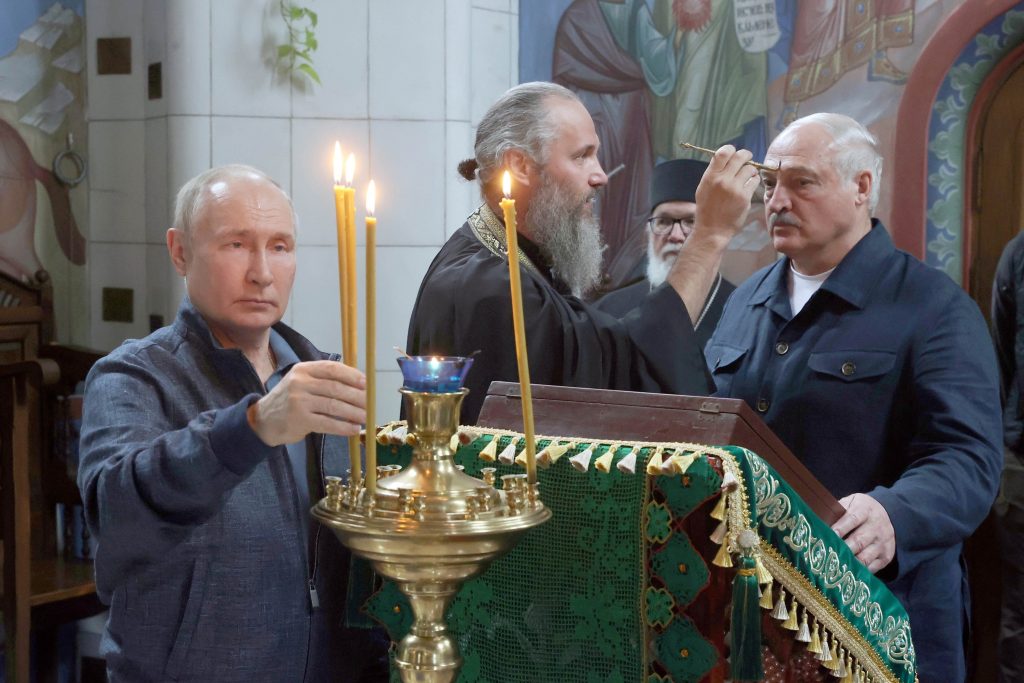
The final chord of the period under review was Lukashenko’s next visit to Russia and a meeting with Vladimir Putin in St. Petersburg. The meeting took place a few days before the Russia-Africa summit, which is very important given the activities of Russia and Belarus in Africa and the Wagner factor. Obviously, this topic requires further coordination at the level of responsible persons in Moscow and Minsk. A minimum of information on the results of the meeting of the two presidents and, at the same time, the maximum external entourage (a meeting without ties, Putin personally driving a car, putting Lukashenko in the passenger seat, a trip to Kronstadt, etc.) suggests that a range of significant issues, but of a strategic nature, was discussed. We will most likely learn about the essence of the negotiations in the near future – perhaps, by indirect signs.

